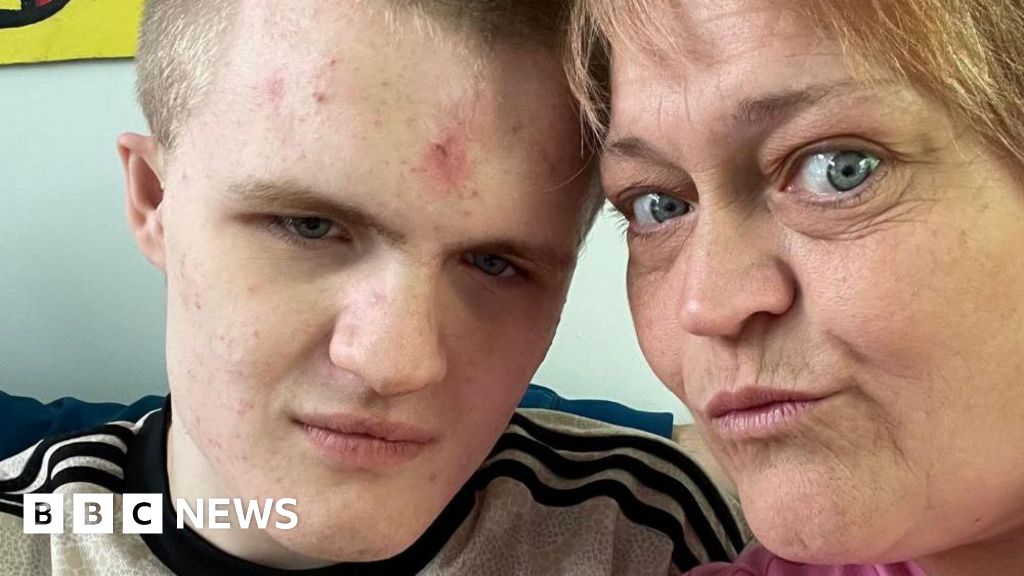Bu içerik, otizmli bir oğlu olan annenin yaşadığı zorlukları ve oğlunun hastanede geçirdiği süre boyunca yaşadığı sıkıntıları ele alıyor. Sebastian isimli oğlu 19 yaşında ve hastaneden taburcu edilmesine rağmen karmaşık ihtiyaçları nedeniyle yaşayabileceği bir yer bulunamıyor. Annenin yaşadıkları ve sağlık kurumlarıyla yaşadığı iletişim sorunları detaylı bir şekilde ele alınıyor. Oğlunun otizmli olması ve sözlü olmaması da vurgulanarak, ailelerin otizmli yetişkin çocukları için karşılaştıkları zorluklar üzerine bir farkındalık yaratılmaya çalışıyor. Ayrıca, farklı sağlık kuruluşlarının benzer durumdaki hastalarıyla ilgili bilgiler de paylaşılıyor. Bu içerik, otizmli bireylerin yaşamlarını sürdürebilmeleri için gereken desteklerin önemine dikkat çekiyor.
Kaynak: www.bbc.com

 Family handout
Family handoutA mother whose autistic son has spent 10 months in hospital has said he is being locked away and robbed of a future.
Amanda said her son Sebastian, 19, is deemed fit for discharge, but the health trust has been unable to find somewhere for him to live due to his complex needs.
The Southern Health Trust confirmed it was continuing to liaise directly with the family to find the most suitable care setting.
BBC News NI asked all the trusts for their figures, and it has emerged that at least 22 people in adult mental health hospitals can be discharged but have nowhere to go. One patient has been in hospital for more than a year.

 Family handout
Family handoutSebastian was born with autism and is non-verbal.
He first started respite care when he was four, as his mother needed help because she felt his behaviour was no longer manageable at home.
He then went to live in a home for children that catered for his needs.
However, when he turned 18, he could no longer live there due to his age.
Following a meltdown in January, he was detained in a mental health hospital.
Amanda, from Craigavon, said: “My son is living in hospital because he has autism, plain and simple.
“He’s autistic, has complex behaviours, and I feel like nobody could be bothered with him any more.
“My child does not belong in a building like that; every specialist that he has come across and even his psychiatrists have said he does not belong there.”

 Family handout
Family handoutShe said two weeks after being admitted, her son was fit to be discharged from hospital.
But the local trust has been unable to find suitable accommodation.
His mother said the staff dealing with her son were very good, but a more experienced team was needed to manage his behavioural issues.
“To see his giant teddy bear sitting on the bed beside him… he is stressed,” she said.
“I feel like he is being treated like a prisoner with limited access to the outside world. He has no life.
“He has the mind of a child. It’s so unfair.”
The type of accommodation depends on the needs of the patient; it can be a supported-living placement, a residential care home, or a place provided by the Northern Ireland Housing Executive.
The trusts come together every fortnight as part of a group, known as the resettlement oversight group, to discuss placements.
Through a Freedom of Information request, the BBC has seen minutes of some of those meetings.
They revealed:
- Ongoing challenges in finding suitable placements for people with severe learning disabilities and complex autism
- Some providers would be “pulling back from providing these placements”
- Cost as well as provider availability was prohibiting placements in cases
The Department of Health said it was aware that the availability of community placements was a key barrier to enabling timely discharge from inpatient services.

 Family handout
Family handoutKerry Boyd, of Autism NI, said a review of autism adult services was taking place in Northern Ireland.
“Many families tell us that they are deeply concerned about the lack of provision for their children post-18, whether that is in relation to lifelong learning, mental health, employment, or supported living,” she said.
“It is crucial that autistic adults are allowed to have the same opportunities to live an independent life as the rest of society, and that means there must be supports in place for them to live within appropriate housing too.”
A spokesperson for the Southern Trust, which is in charge of Sebastian’s care, said: “As part of that care, all our in-patients have access to green spaces alongside opportunities to participate in purposeful and meaningful daily activities.
“We remain committed to working with other partner agencies to find the most suitable supports and placements for individuals with complex needs.”
They said less than five other people were in a similar situation.
In addition, they said there were 10 residential homes in the trust area registered with the care home watchdog, which provide care for people with a mental illness.
“However, it is not possible to specify the number of beds available as the suitability of each placement is based on assessed needs,” the spokesperson added.
“The Southern Trust cannot comment on the waiting list policy for admission to each independent sector care home.”
The situation in other trusts
As of 28 October 2024, the Northern Trust had 10 patients in adult mental health wards who have been deemed medically fit for discharge and require a residential placement option.
The length of delay ranges between four days and 354 days.
The trust said the patient waiting the longest required a bespoke placement that had been sourced on two separate occasions and unfortunately had not been able to proceed due to change in circumstances.
The South Eastern Trust said there were two patients in adult mental health wards deemed fit for discharge – one had been waiting 16 days, the other four months.
Both are awaiting housing from the Housing Executive.
As of 4 November 2024, the Western Trust had two patients in the same situation.
One has been waiting 70 days.
“There are 204 adult mental health supported living placements across the Western Trust area,” a spokesperson added.
The Belfast Trust said it had fewer than five patients. The longest wait is currently 105 days.




Yorumlar kapalı.